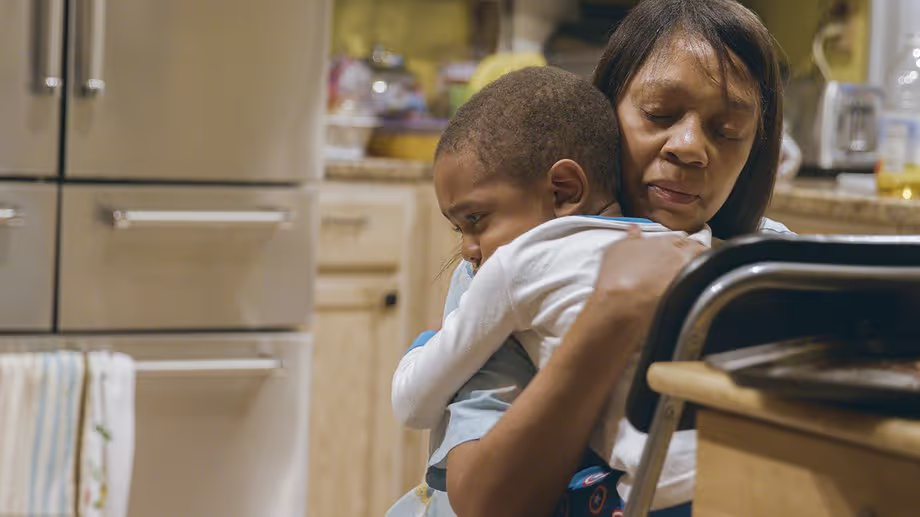Through The Night Lesson Plan: Intersections of Care Film Clips
Film Clips

Clip 1: Great Expectations [00:11 - 00:25]
Our expectations of mothers are often so unrealistic and out of reach. Mothers, contrary to popular belief, are not superheroes. They are human beings who feel real feelings and who, as you will witness in this clip, are overworked and underpaid. Who pays the price for these great expectations? Are they really that great after all? Who or what is it that we really value in this country -- strong family bonds or the almighty dollar?
Clip 2: The Evolution of Family[00:25 - 1:36]
What we consider to be a family has changed over the course of time and continues to do so. In this clip, we explore the various iterations of family that continue to form in response to our ever-evolving society. take an intimate view into the inner workings of mothering and motherhood and what it entails to be a part of a child-rearing community in the form of an urban daycare center environment that runs 24 hours a day, seven (7) days a week.
Clip 3: It Takes A Village[4:42 - 6:07]
In this clip, we see a model of community care rooted in the Black Radical Tradition model for community health, free lunch program, community care, and culturally-relevant education. The day care center featured in Through The Night falls under the category of an organized movement of Black and Brown women who address issues of intersectionality directly for the sake of our own revolutionary care. The families it seeks to help are in a constant state of insecurity. The interdependence between mother and daycare provider are evident.
Clip 4:[7:54 - 08:06]
The power of community is unmatched and that is showcased in this clip. Deloris gathers the children who attend her daycare and has a conversation with them. She offers them a reminder of the community that exists when they are together: “Let’s not be rude because we’re all friends and we all love each other.”, and all of the children exclaim: “YES!”
Clip 5: [19:32 - 20:41]
Working mothers put in so much work for their children and their well being, as highlighted in this clip. One mother shares that “I’ve been working 7 days for almost 2 months. I’m very tired. If I’m not working one job, I’m working another job. I’m always working non-stop.” This clip highlights the sacrifices that mothers have to make, the compromises that must be made, and the intersections of capitalism that exist.
Activity: Research health insurance in the US (Obamacare); probe into the corporate practice of keeping workers part-time to avoid paying insurance; job-security for single-parents;
Guided Questions: Where is the American Dream in all of this? What is the impact on limited time with family on education? (How) Is the community equipped to respond to this need? Why or why not?
Clip 6: [22:32 - 23:49]
At the local Thanksgiving Day Parade, Deloris and Patrick reflect on the mothers of the children of whom they care for. It's easy to forget the care and community that places like child care facilities embody in people's lives. Patrick and Deloris speak on the lack of care from the government: “There are families out there that need help. They need a net” … “‘Cause once I’m full or if other providers are full. Then where are those children going?”. Their words show the amount of care that goes beyond just the families serve and the impact they make within the facility.
Clip 7:[26:51 - 29:02]
It's often easy to forget how the decisions we make, the environments we build, and the situations that we are in affect the children in our lives and their relationships. In this clip, we witness how children and caretakers grapple with the realities that exist within many single caretaker family units and how they are affected by the perception of others for that. A young girl expresses her thoughts on her experience with daycare, making friends, and how, through her development of her relationships, she began to like her experience. Her mom, on the other hand, is angry, at a crossroad with work, and faces criticism for the decisions she has to make to care for her children.
Guided Question: What is the social-emotional impact on kids from being in day care from a young age and for extended hours per day? What is the impact of the separation from their children on the parents?
Activities: Conduct interviews with children and parents for whom both questions posed above are relevant.
Clip 8:[29:03 - 31:35]
Young children learn through play. In this clip, we see two siblings engaging in physical, imaginative, and explorative play, but are quickly brought back to course by their mother. In particular, we see a young boy, Noah, continue to play and push his boundaries while his mother and sister share a moment of frustration around wants and needs. This clip highlights the balance that caretakers and children encounter when trying to express themselves and meet real life needs and responsibilities.
Case study: Why is Noah having a hard time? How do we assess the social emotional health of young children who are not able to articulate their feelings of frustration verbally?

